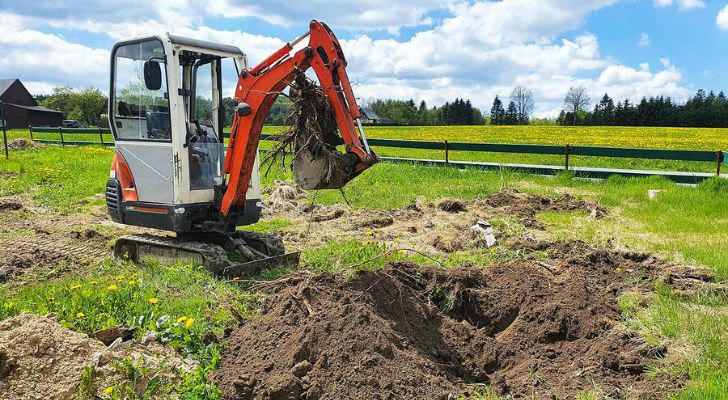Dig Smart, Spend Less: America’s 2025 Guide to Renting vs. Buying an Excavator
Whether you’re a professional contractor tackling major construction or a weekend warrior reshaping the backyard, choosing between renting and buying an excavator can make or break your project budget. In this in-depth guide, we’ll explore the true costs of ownership, reveal the unbeatable flexibility of renting, and help you decide once and for all which choice delivers the biggest bang for your buck in 2025.

1. The High Stakes of Buying an Excavator
Excavators are engineering marvels, but that sophistication comes at a price. New compact models suitable for home projects start around sixty thousand dollars, while full-size machines for heavy construction often top three hundred thousand. Even lightly used units rarely dip below fifty thousand dollars.
Beyond the sticker shock, ownership brings:
Financing & Depreciation
Monthly payments on a one-third-million-dollar machine can run over five thousand dollars—with interest. Over five years, depreciation can erode 40 to 50 percent of a new machine’s value, meaning your asset loses tens of thousands of dollars in buying power.
Maintenance & Repairs
Routine service—oil changes, filter replacements, hydraulic fluid, track tensioning—averages six to twelve thousand dollars per year. Major repairs on engines or hydraulic pumps can cost five figures in a flash, especially once warranties expire.
Storage & Insurance
Insuring a workhorse excavator can add three to six thousand dollars annually. Secure outdoor storage or indoor shed space often incurs rent or upgrades that tack on another one to three thousand dollars per season.
Transportation & Logistics
Moving your excavator between job sites requires a heavy-duty trailer and truck, or specialized hauling services. Trailer purchase and maintenance can run fifteen to thirty thousand dollars, while hiring transport costs two to five hundred dollars per move.
All told, buying an excavator can tie up hundreds of thousands of dollars in an asset that demands constant care and still loses value year after year.
2. The Flexibility of Renting: Pay Only for What You Use
Renting lets you tap into world-class excavators with zero long-term commitment. Daily rates start under two hundred dollars for mini-excavators and around five hundred dollars for standard units. Weekly packages often drop that rate by 20 percent, and monthly agreements can go as low as fifteen hundred to two thousand dollars for a mid-size machine.
Key rental benefits include:
No Depreciation Worries
You never own the machine, so you never lose money to market value declines. Once your project ends, you simply return the equipment—no reselling hassles.
Maintenance & Support Included
Most rental agreements cover all routine maintenance and minor repairs. If the machine breaks down, the rental company swaps it out, minimizing downtime and unexpected bills.
Access to Latest Technology
Rental fleets are refreshed regularly. You’ll often work with the newest models featuring advanced hydraulics, operator comforts, and fuel-saving systems—without paying full price.
Scalable to Project Needs
Need a compact 3-ton model for tight spaces one week and a 30-ton powerhouse for trenching the next? Rentals let you adapt on the fly, ensuring you never over- or under-invest.
3. True Cost Comparison: Two Months of Work
Imagine you need a 25-ton excavator for a two-month residential demolition and foundation job:
Renting Scenario
Monthly rental rate: $1,800 Two-month total: $3,600 Fuel & minor wear: $200 Total: $3,800
Buying Scenario
Purchase price of comparable new excavator: $180,000 Financing (at 5% APR over 5 years): $3,400 per month Two-month payments: $6,800 Depreciation in two months (approx. 3%): $5,400 Maintenance reserve (6 months pro-rated): $1,000 Total cost in two months: over $13,200
Even before adding insurance and storage, buying costs more than three times renting. Unless you’ll use that machine intensively for several years, heavy ownership expenses quickly eclipse rental savings.
4. When Buying Makes Sense
While renting shines for short-term projects and occasional use, purchasing can pay off if:
Daily, Long-Term Use
If you’ll operate the excavator more than 200 days per year over multiple consecutive years, ownership can become more cost-effective than rentals.
Custom Modifications & Attachments
You need hydraulic thumbs, specialty buckets, or other bespoke setups that you’ll reuse constantly—ownership lets you invest in and keep those add-ons.
Tax Considerations & Depreciation Benefits
In certain cases, depreciation write-offs and investment tax credits can offset a significant portion of purchase costs, tipping the balance in favor of buying.
Asset Equity for Business
Owning heavy equipment can strengthen a company’s balance sheet and borrowing power, beneficial for established contractors seeking to leverage assets.
5. Pro Tips for Smart Equipment Decisions
1.Estimate Utilization Accurately
Track your actual machine hours or days. If your usage is below 100 days per year, rentals almost always win on cost.
2.Negotiate Rental Discounts
Commit to multi-month bookings to unlock volume or loyalty rate reductions—often 10 to 20 percent lower than standard published rates.
3.Compare Multiple Providers
Local rental houses, national chains, and peer-to-peer platforms can differ by 15 to 30 percent on rates—shop around.
4.Bundle Attachments
Secure hydraulic breakers or plate compactors in your rental package at a reduced combined rate versus individual add-on charges.
5.Plan for Peak Demand
Book excavators early in busy seasons to avoid last-minute surcharges and guaranteed availability.
Conclusion: Rent for Flexibility, Buy for Commitment
Choosing between renting and buying an excavator hinges on project length, frequency of use, and long-term business strategy. For most Americans tackling occasional or short-term digging, renting unlocks cutting-edge machines at a fraction of the cost, with zero maintenance headaches. But if you’re running day-in, day-out operations and need custom setups, buying can deliver value over the long haul. Arm yourself with realistic cost comparisons and these insider tips, and you’ll dig smart—without digging into your savings.
